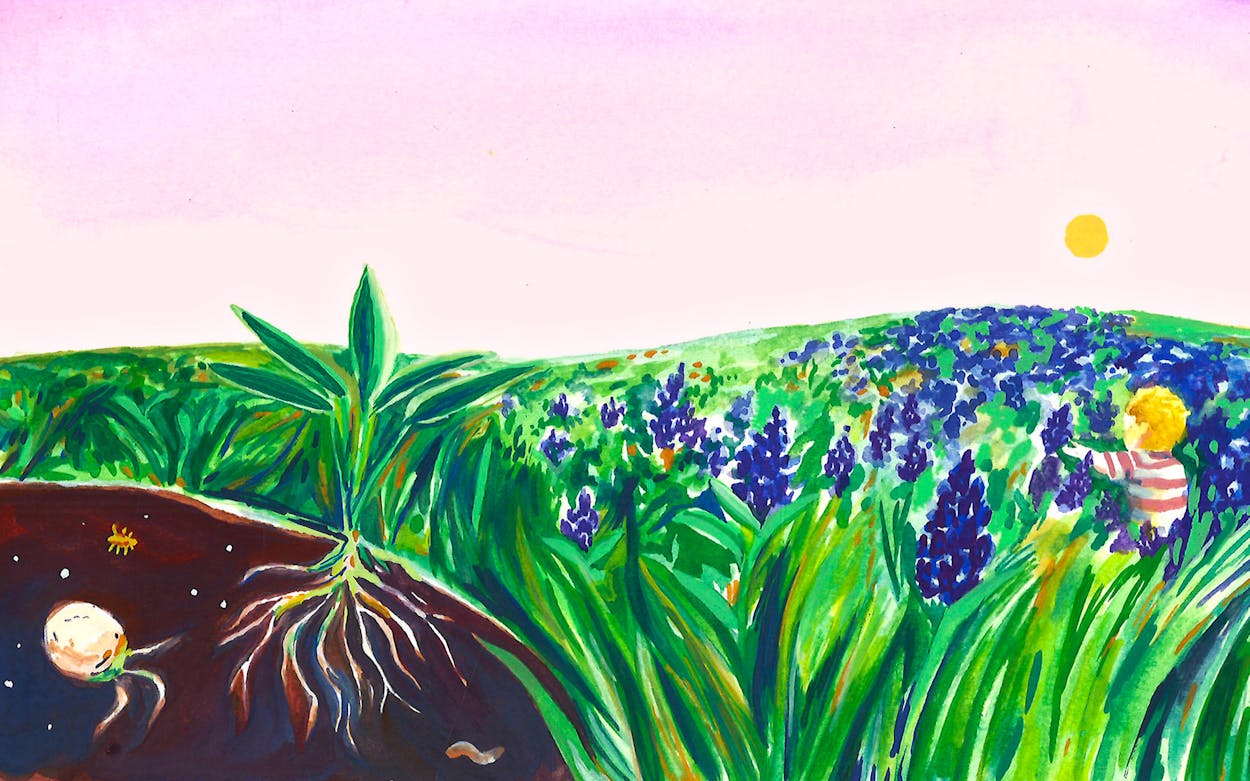Taking family photos in a field of bluebonnets is required by law in Texas, or so I gathered after moving here from Pennsylvania for college in 2006. Texans’ affinity for bluebonnets, like all things emblematic of the Lone Star State, puzzled me at first. But in 2014, having recently added a golden retriever puppy to our family, my husband, Chris, and I were eager to snap some bluebonnet pictures for the first time. The photo we took of Trudy surrounded by flowers at St. Edward’s University, with the Austin skyline behind her fluffy ears, still hangs on our living room wall (and, Chris was proud to report, briefly shot to number one on the r/Austin subreddit). We continued the annual springtime tradition over the next decade. Once, Trudy escaped and romped joyfully across the field in a blue-and-golden blur, interrupting other families’ photos.
In 2020, we brought home another retriever and named her Pearl. Neither Chris nor I had ever imagined being a two-dog household, but two years into a miserable infertility struggle, morale was low, and I knew another puppy would be a good distraction. Anyone who has ever dealt with infertility knows that staying busy is the key to warding off despair, and Pearl helped. We took her to weekly obedience classes, carried her outside for 2 a.m. potty breaks, and brought her on camping trips. (Because both dogs had a penchant for commandeering our sleeping bags, we even bought them their own miniature tents, which prompted double takes from other campers.) When the clinic called to tell us that another IVF cycle had failed, and when I would lie on the couch in pain after another surgery, the dogs seemed to know. Trudy would lean her head on my lap while I scratched her ears, and Pearl’s puppy hijinks always cheered me up a little. Still, doting on our pets was starting to feel a little sad, like playacting at being parents, when what we really wanted was a child.
After our seventh embryo transfer, we went to the beach in Galveston in an attempt to distract ourselves from the always agonizing wait for the next blood test. The first test had come back positive, but then the number hadn’t doubled the way it was supposed to, so we were in a strange limbo. Hope wasn’t an emotion I allowed myself to feel, having been disappointed so many times before. I now belonged to a depressing category called “recurrent implantation failure,” a label given to women for whom IVF fails repeatedly. We even tried surrogacy, and that didn’t work either. In Galveston, I’d been excited to take Pearl to the beach for the first time, but as she bounded eagerly across the sand and I snapped photos, I burst into tears. Would Chris and I ever take a baby to the beach? We passed families with toddlers splashing in the water, school-age kids building sandcastles, teenagers sullenly scrolling on their phones. Envy rose in me like a fever. What I wouldn’t give to have a sullen teenager someday, I thought.
The next morning, a nurse called: my test results were back on track. I felt numb, certain that this good fortune wouldn’t last, but it did. The next nine months were blissfully normal. How strange and wonderful to go to a doctor’s appointment and not hear bad news! None of it felt quite real until my baby was on my chest: a red, squalling, squishy six-pound potato.
August is well out of the potato phase now. He’s nine months old, crawling faster every day, a cheerful, cherubic baby with blond hair and blue eyes. A few weeks ago, we returned to St. Edward’s to take bluebonnet pictures. Photographing a baby is harder than photographing a dog, especially since Augie was intent on crushing the flowers in his tiny, chubby fist and trying to eat them. The photo we should’ve taken was one of all the theatrics behind the lens: Chris jingling his car keys to make Augie smile, me bouncing him up and down in my arms and talking in a silly, high-pitched voice to elicit a giggle. The overall feeling was one of intense gratitude, mild shock that I was getting to have this experience, and, sure, some sleep deprivation. We didn’t bring the dogs, but we later snapped a photo of all three creatures next to a patch of bluebonnets in our neighborhood, Augie kicking away in his stroller.
The thing that has surprised me the most about parenthood, in my very limited experience, is how bittersweet it is. I feel acutely aware of the passage of time in an ever-present, existential way. Everyone says “It goes so fast!,” and they’re right, but it’s not just that. I’m so content simply being with my son that I desperately wish I could freeze time and stay in these moments, and yet they keep unspooling. I expected taking care of a baby to be grueling, after so many friends dealt with postpartum depression and after I’d read so many articles confessing how isolating and miserable early parenthood can be. And it is hard at times, but the good parts are so much more powerful. When I blow raspberries on Augie’s belly and he laughs, the feeling is like a chemical high. Even when he’s crying in the middle of the night, even when I’m cleaning up a diaper blowout or a spit-up explosion—both of which happened during our bluebonnet photo shoot—there is nowhere else I’d rather be. Sitting in a rocking chair on our porch, holding my son close and smelling his downy hair, I feel an intense wistfulness, an emotion I recently learned is called anticipatory nostalgia. Why won’t time pass at a more reasonable speed?
For years, as we repeated the loop of trying and failing to have a child, life was agonizingly slow; now it’s much too fast. I teared up after dropping Augie at day care for the first time, not because I couldn’t bear to be apart, but because for a moment I flashed forward to dropping him off at college, as ridiculous as that sounds. The intensity of this sadness astonishes me, and I recognize it in older women I’ve met when out with my son. They get misty-eyed and say things like “I miss those days” and “Savor every moment.”
The irony, of course, is that if you try to hold on to a moment too tightly, it takes you out of the experience. Taking photos is an attempt to capture the present and hold on to it forever. This effort always fails, but I keep trying. I scroll through photos after Augie has gone to bed, first seeing him in the bluebonnets, then watching him grow smaller and smaller, until I see his embryo picture, the black and white one an embryologist handed me at the clinic, when he was a five-day-old cluster of cells in a petri dish. How can it be that that clump of cells is now a little boy crawling through the bluebonnets? Next spring, he’ll be a toddler walking through them. It is the most ordinary thing, and the most amazing.








